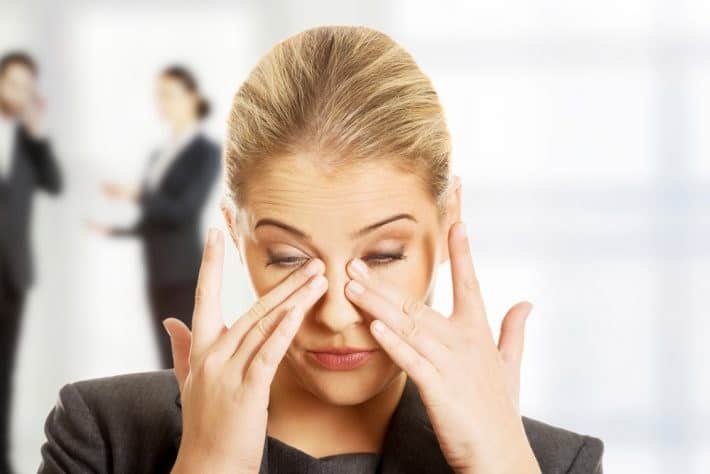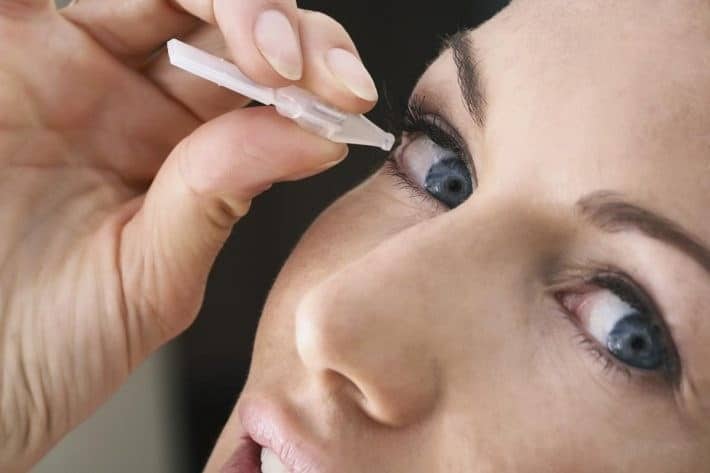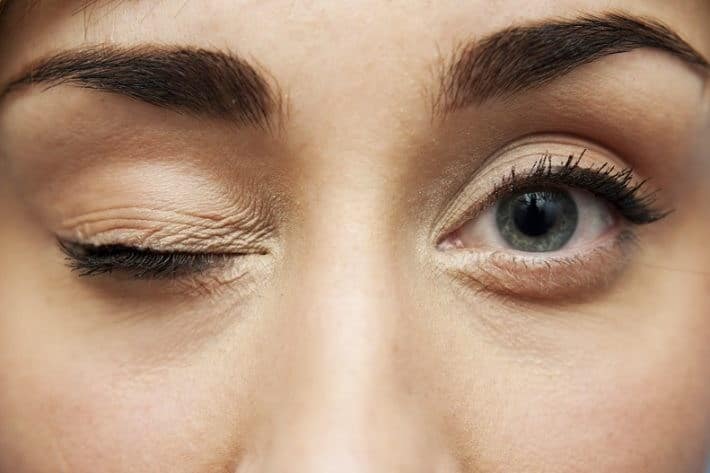Ever experienced an uncomfortable twitching in your eye, similar to leg cramps? Then you know how uncomfortable it gets. Also called eye spasms, eyelid tics, or “myokymia,” that pesky twitching is caused by involuntary muscle spasms in the small muscles and nerves around the eye.
When the twitching is limited to one eye, the spasms typically go away on their own in a few weeks. It’s safe to say, but with a few exceptions, there shouldn’t be any major cause for concern.
Causes of Eye Twitching
The thing is, doctors and scientists aren’t 100% certain what it is that causes the eye to twitch. Since it’s not considered a serious medical disorder, there aren’t many studies dedicated to it. So if you want to find out what’s causing your eyelid to twitch, check out the list below:
1. Stress

Are you more stressed recently? Dr. Monica L. Monica, M.D., clinical spokesperson for the American Academy of Ophthalmology, said that among all causes of a twitchy eye, stress definitely tops the list.
Basically, it’s your body’s way of telling you to distance yourself from stressful situations. When you’re stressed, your body produces hormones that prepare it for fight or flight. These hormones also cause muscle arousal, which in turn affects your eyelid muscles. When you’re antsy about a deadline, a big event, or just plain troubled by life, take a few days to recover and the twitching will likely go away.
2. Fatigue

If you’ve recently been suffering from sleepless nights, that maybe the cause why your eye is going on strike.
“Research has shown a correlation,” Dr. Wayne Cornblath, professor of ophthalmology at the University of Michigan’s Kellogg Eye Center, told Time magazine, “and we know that getting more sleep can help, but we don’t know why.”
If you think about it, the connection makes sense: overfatigue on the other parts of your body causes painful and visible muscle spasms in the legs and hands. So why not your eyes? Focusing your eyes for long periods of time might be giving them the workout they don’t need right now.
3. Dry eyes

For most of us, work or school responsibilities require us to face a computer screen for several hours daily. Studies have shown that working for more than 7 hours a day at the computer reduces the natural lubricants in tears, resulting in dry eyes. Most patients with dry eye syndrome also suffer from eye twitching as well.
“Though a lot of people think that twitching eyes are caused by stress or fatigue,” says TV’s Dr. Oz, “the real hidden cause is dry eyes. When eyes are too dry, you involuntarily start blinking to keep them moisturized. After a while, the blinking triggers your nerves and tricks the brain into making your eyes twitch even more.”
If you’re looking for ways to alleviate your screen-related discomfort, use your eye drops more often, look away from the screen at least once every 20 minutes, and check with your eye doctor.
4. Eyestrain

This is caused by your eyes having to work too hard to focus, which could result from poor workspace lighting (such as overhead fluorescent lights), straining to see too-small text on a screen, or not wearing glasses with the correct grade. For those wearing prescription glasses, it’s highly recommended that you regularly visit your eye doctor every year, especially if you experience frequent headaches and find that you need to squint to be able to read things, even with glasses on.
5. Allergies

Allergens in general can irritate the eyes, and may cause them to become itchy, dry, and watery. This encourages twitching to develop—rubbing your eyes can cause mast cells to release more histamine into the inner eye tissue and also cause abrasions. Histamine has been linked to eye spasms.
Antihistamine may provide temporary relief, as well as anti-allergy eye drops.
6. Nutritional imbalances

Your body is a temple, you should treat it with the care it deserves. Dehydration can lead to dry eyes, so make sure to get enough water to discourage eye spasms.
An imbalance in electrolytes, which are important in the proper functioning of your muscles, may also be the source of your eye condition. Have you suffered the stomach flu recently, or other digestive issues that cause vomiting and diarrhea? Is yes, stock up on sports drinks and see if that makes you feel better.
A slight decline in vitamin B levels, especially vitamin B12, can negatively affect your muscles and nerves. Feast on a diet of fish, poultry, meat, eggs, and dairy to help those levels climb up. Keep in mind that you’re more likely to be deficient if you’re a vegan or vegetarian (you may want to consider supplements), or if you’re over 65 (we don’t absorb vitamin B as well when we age).
7. Caffeine
You really can’t have too much of a good thing, even something as wonderful as coffee. Research from York University showed that caffeine triggers the release of serotonin and noradrenaline—excitable chemicals that may be stimulating the nerves to induce eyelid spasms. As they say, everything in moderation.
How to stop eye twitching

If you can manage the discomfort from your spasmic eye, then there’s possibly no reason to worry too much. Give it a few days, and most likely it will go away by itself. But if it’s been going on for a while, then you can try the following to alleviate the pain:
- Hot and cold compresses: the eye spasm is caused by a muscle, so providing compress can help calm it down. Start with a warm compress first, particularly before bed. If your eyelid is still switching, try alternating warm with cold, placing each one on the affected eye for about 10 minutes.
- Acupuncture/massage: Have your practitioner know about your condition so that they can include it in their next session. Simply massaging the pressure points by yourself may also help. Concentrate on the eyebrow area and massage in a circular motion for a few minutes. This helps the muscle relax. Then move to the outside of your eye, underneath the eye, and on the inside corner. Remember to put only slight pressure.
- Reduce stress: Clear your mind from the stressors that may be aggravating the situation. Play relaxing music, take a walk, call a friend, or focus on a picture that soothes the eye. Yoga, meditation, and journaling may also help.
- Drink less caffeine: Soda and coffee are your enemies, so stay away from them. Don’t forget to count other potential sources of caffeine, including some pain relievers and energy drinks. Stock up on tonic water—there is some anecdotal evidence that it can help relax muscles because of the quinine content.
- Set an earlier bedtime: If you suspect lack of sleep may be causing your eyelid spasms, experiment with going to bed 15-30 minutes earlier than your usual bedtime.
- Face steam: Yes, not only can steaming your face can calm and hydrate your eyes, but it will also open and clean your pores. Don’t forget the bonus facial benefit. To try this, simply put some steaming water in a bowl, lean over the bowl at a distance with the top of your covered by a towel and let the steam warm your face. Also try adding some essential oils like eucalyptus, lavender, and rose.
When to see a doctor
Some neurological conditions may be the underlying cause of the involuntary eye twitch: blepharospasm (excessive blinking and spasming of the eyes wherein a person’s eyelid feels like they are clamping down shut, and cannot be opened without great effort; may often lead to functional bindness) and hemifacial spasm (involuntary tics around your eyelid, cheek, or mouth which may expand to other parts of your face, usually caused by compression of one of the facial nerves).
Occasionally, eyelid spasms could be early signs of other neurological disorders, including Bell’s palsy, dystonia, Parkinson’s disease, multiple sclerosis (MS), and Tourette syndrome, but this is highly unlikely in most cases.

“Twitches are typically benign and should only last for a few weeks,” says Donny Suh, MD, associate professor at the Truhlsen Eye Institute of the University of Nebraska Medical Center in Omaha. He adds that a lingering eye twitch could actually lead to more anxiety, which prevents it from going away. “The problem is that once you develop these twitches, they tend to cause a vicious cycle.”
It’s best to check with a specialist for other symptoms such as spasms in other parts of your face, redness or swelling in the eye, discharge, double vision, or if your eye completely closes when it twitches.
Whether the spasms last for a few short weeks or several months, it would be wise to figure out the underlying cause of the condition. Dealing with the issue as early as possible might save you a world of trouble in the long run.

